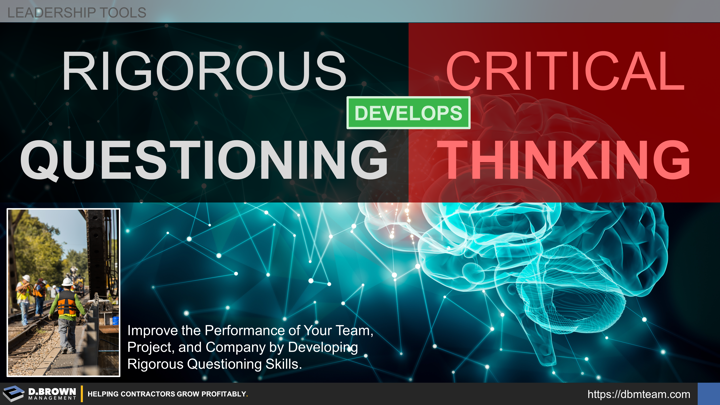It will only continue to grow in importance as technology assumes many of lower tier responsibilities in the construction industry.
There are many who believe it is an innate skill that can’t be developed.
If this is the case then your talent strategy has to focus on:
- Remapping your workflows to consolidate tasks requiring critical thinking to fewer people who can do them the best so their leverage is maximized.
- Relentlessly review your team and eliminate those with the lowest degree of critical thinking skills who are in roles where those skills are required.
- Aggressively recruit better talent to your team developing screening tools to assess critical thinking skills.
On the other hand there are many new bodies of research demonstrating that the brain can be exercised and developed like a muscle.
In this case what your talent strategy must focus on:
- Learning tools for improving critical thinking skills in yourself and others.
- Deliberately using these tools as part of daily work until they become habit.
- ”Exercising” your brain and the brains of everyone on the team until they hurt - just like physical exercise.
Thinking is really just about asking ourselves then answering a series of questions to help us make a good decision.
Critical thinking is quite simply asking ourselves a much larger and more difficult set of questions then answering them from a larger base of knowledge. All done typically very quickly.
If you want to teach someone else how to think like you do you start by organizing your inner dialog into a series of questions that you can ask them.
As you ask them the questions and they struggle to answer you are building their skills.
As they come up with different answers than you did it is important to ask why. It will typically be one of several reasons:
- The questions or sequencing needs to be adjusted.
- They are missing some experience or knowledge to answer the question the way you would. Identify what’s missing and teach.
- They are not making the connections between the question and knowledge they have quick enough. Help them see the connection and continue exercising.
Do this over and over daily. You will get better at coaching and they will get better at learning. If you took just about any person and wanted to train them for a marathon there is nearly a 100% chance of successful completion but it takes deliberate practice every day for an extended period of time.
Developing critical thinking skills in a team is no different.
Learn how we help construction teams develop better critical thinking skills.

